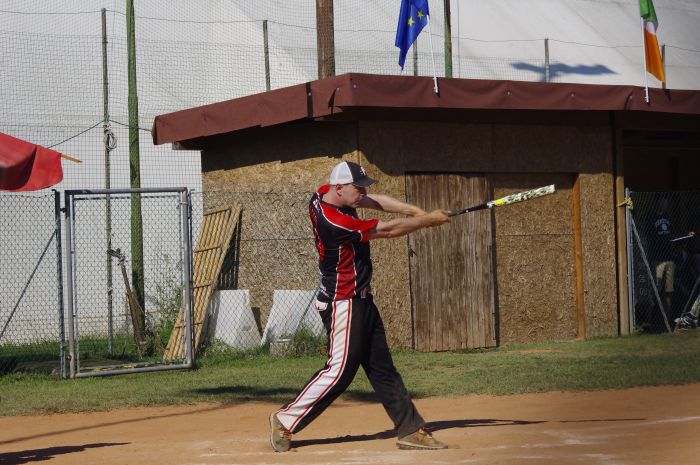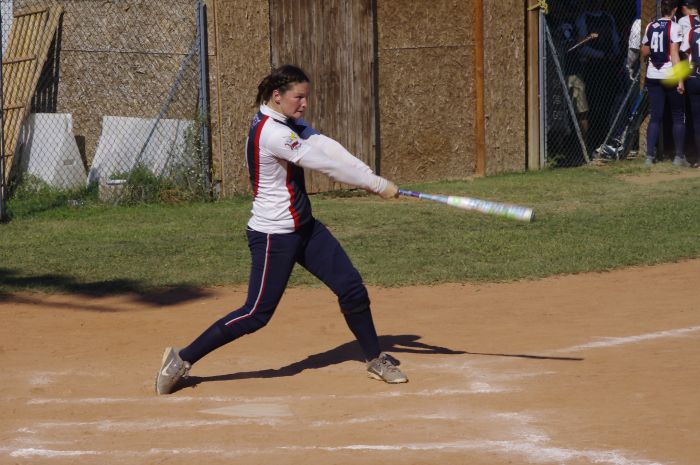.jpg)
Ben Taylor, a former GB Slowpitch Team player, went to Riccione in Italy during the week of 30 July-4 August to report on the European Slowpitch Super Cup for the BSF website. Here, he reflects on a great tournament and its implications for the future of slowpitch softball in Europe.
.jpg) From the perspective of playing softball in Britain for over 10 years -- a snip compared to many of those who still play -- it was such a pleasure to go to a tournament where I did not recognise most of the players or know where they hit or how strong their arms were. This was a challenge that the tournament presented for everyone, with the teams, bringing a different angle and excitement to each game.
From the perspective of playing softball in Britain for over 10 years -- a snip compared to many of those who still play -- it was such a pleasure to go to a tournament where I did not recognise most of the players or know where they hit or how strong their arms were. This was a challenge that the tournament presented for everyone, with the teams, bringing a different angle and excitement to each game.
The fact that 16 teams participated this year – a record number -- was not lost on those competing or on those who organised the tournament. Speaking to Mike Jennings, who is the European Softball Federation’s Technical Director, I know he was very impressed with what was achieved in Riccione, from the grounds to the officials to the commitment of the local teams who supported the competition.
Riccione is a town on the east coast of Italy and very much a holiday destination. There are a huge number of reasonably-priced hotels, complemented by white sandy beaches. One Irish player joked, when I mentioned the number of teams that had turned out: “What a surprise -- you hold the tournament in a beachside town in Italy and everyone wants to come!” It’s a fair point -- the teams certainly enjoyed the fact that they could head to the beach between games.
However, the tournament was more than just the venue.
The umpires who represented the European Softball Federation were very good, and they worked extremely hard to ensure that games were officiated to the highest of standards. That’s not easy when, to start with, you find yourself a whole crew down. At the last moment, three umpires could not attend, which meant the other crews had to cover their games. Bearing in mind that games started at 9.00 am and did not usually finish until 9.00 pm, the 'blues' were putting in 12-hour days. Ok, not umpiring every game -- but they still had to be at the venue all day and when they were on the field, they had to maintain the high standards they had set for themselves.
Chris Moon, who was assessing the umpires throughout the tournament for the ESF, pointed out that he is seeing a very different game from the one the players see. Where players might see soft hands and great coordination on a double play, Chris sees the movement of the umpires to ensure they get the best angle on the play and get the tight plays right. I know he was very impressed with what he saw.
The teams and players who took part in the Slowpitch Super Cup played the game the right way. Or at least for the most part, as there were some shenanigans about rubbing out lines in the batter’s boxes and whether batters where standing in the box or not.
The week had head-first slides into first base, diving catches over the outfield fence and tremendous throws from the outfield. One Irish player who was representing TNT put her body on the line with a head-first slide at home. For her trouble, she got a fractured cheek bone and a trip to the hospital. She was safe at home, though.
That brings me to the medical staff who attended all day, every day. The games could not start if there was not a medical crew in attendance, and they were always on hand to provide help with scrapes and bruises and, in the above-mentioned situation, they attended to the player until an ambulance arrived. I should add as well that the ambulance was on site within 10 minutes of the incident happening.
After the final, I was speaking to one of the British players when an Italian player approached and asked if the British teams were made up of paid professionals. While it was funny at the time, it is, on reflection, a compliment well-earned for those of us who play slowpitch softball in Britain.
It is easy to overlook that while we are not as far ahead in baseball or fastpitch as some of our European cousins, we rule the roost when it comes to slowpitch softball. And no matter that others may scoff at the game itself and give it names like ‘giggle ball’ or ‘beer ball’, when those people who ridicule show up to play, they can’t compete. The swing is different, the tactics are different (you sacrifice runs for the outs rather than the other way around) and it is not as easy to hit a ball pitched with a 12-foot arc as it may seem. The baseball players who played for the Italian teams can testify to that.
Tournaments like these, where the game involves competitiveness and skill mixed with banter and fun, injects interest and grows the game, and gives it the legitimate platform it deserves. Hopefully, this will drive more and more countries to take notice.
I sincerely enjoyed myself at the 2018 European Slowpitch Super Cup, and was privileged to see a week filled with great ball and fantastic management on and off the field. I hope the standard achieved in this Super Cup can be replicated in years to come, as we start to see representation from even more countries.


